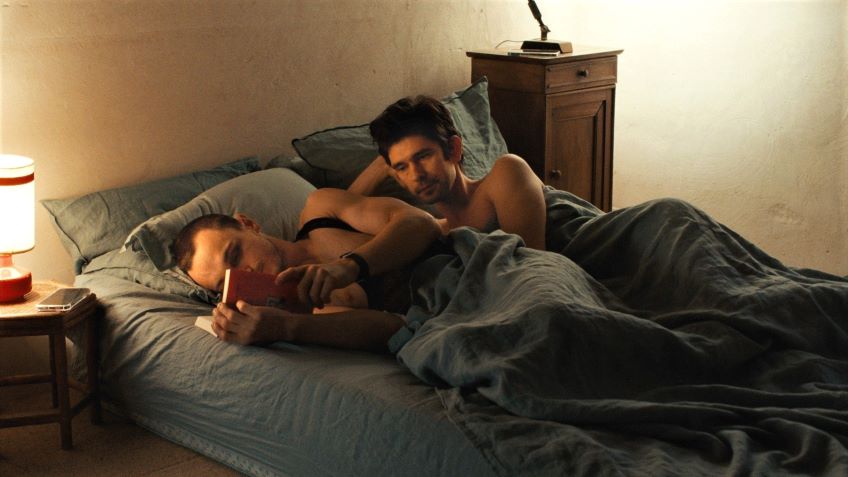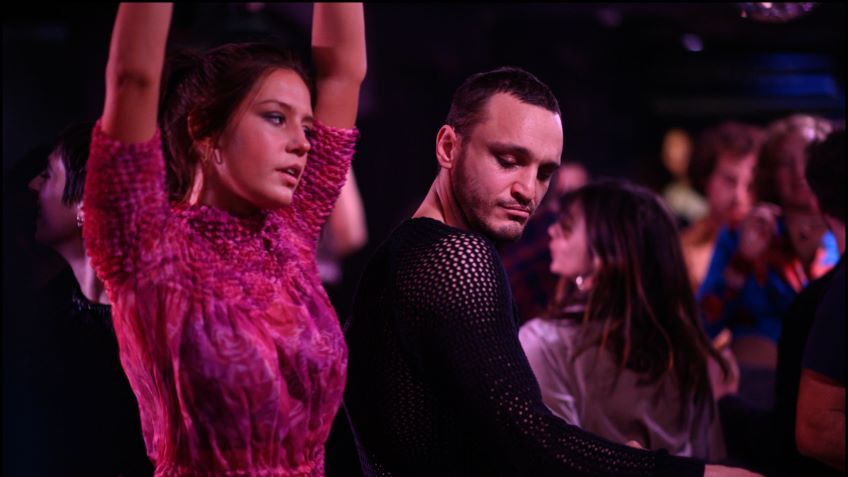Joyce Glasser reviews Passages (September 1, 2023) Cert 18, 93 mins.
With Passages, the Memphis born writer-director Ira Sachs, 57, again examines a same-sex relationship, as he did in his autobiographical, breakout feature, Keep the Lights On and again in the acclaimed Love is Strange, in which an older gay couple with a comfortable, intellectual lifestyle, suddenly find themselves homeless in NYC’s red-taped property market. The compassionate Little Men followed, showing the devastating impact of adult foibles – and New York Real Estate – on the close friendship of two young boys. Property, if not ownership, plays a smaller role in Passages. Here, the action is set in Paris where married couple Tomas (Franz Rogowski, Transit, Happy End) and Martin (Ben Whishaw, ‘Q’ in Skyfall, Spectre, No Time to Die) argue over their shared country house when Tomas falls in love with a woman (Adèle Exarchopoulos, Blue is the Warmest Colour).
Sachs, rejected from two films schools, headed to NYC to learn his craft. He found his apprenticeship working on a film about the Aids crisis, as assistant to Norman René, who himself died of Aids at age 45. In Passages, Aids is not mentioned, nor is any STD, although the main character, Tomas, a self-obsessed, insecure film director with psychopathic tendencies, does not use condoms.
Our introduction to Tomas, a German filmmaker, in his late thirties, is watching his temperamental directorial style on the last day of a film shoot, although we learn nothing about what the film is about and never see him editing it. You might be thinking of German filmmaker Rainer Werner Fassbinder’s The Bitter Tears of Petra von Kant, but Tomas does not appear that self-aware.

At the wrap party, there is evidence of some ill feeling between Tomas and his partner, British graphic printer Martin. Martin leaves early while Tomas remains and is invited to dance by Agathe (Exarchopoulos), an attractive schoolteacher in her late twenties.
When Tomas returns home the next morning, he tells Martin about his experience sleeping with a woman and admits he found it exciting. Martin remains calm, reassures Tomas with a kiss, but does not indulge him. ‘This always happens when you change film’, he says, ‘you forget’.
But this time it’s different. Within a short time, he moves out of the beautiful apartment he has shared with Martin and shows up at Agathe’s with numerous boxes of belongings. She seems uncomfortable, less by the clutter than by the permanence, but he assures her he’s there to stay.
He might have stayed longer had Martin not taken up with a less flashy, less mercurial, more considerate if not intellectual, author Ahmad (Erwan Kepoa Falé). Tomas is genuinely bemused when Martin asks Tomas to hand back the keys.
Martin also tells Tomas that there is a couple interested in buying their country house, which Tomas objects to. He seems to be hedging his bets, unable to accept that his life with Martin is over.
After discovering she is pregnant and that Tomas wants the baby, Agathe prepares dinner for her parents to meet Tomas for the first time. He shows up late, wearing flamboyantly “gay” attire, a patterned tight cropped halter top and tight, colourful trousers, and immediately takes offence at Agathe’s mother Edith’s (Caroline Chaniolleau) direct questions. She patiently explains that, knowing Tomas has been in a relationship with a man, and that he might want to return to Germany one day, she wants to be sure he will be there to care for Agathe and their baby. He appears resentful, and Agathe, caught in the middle, takes his side.
Meeting the parents and the prospect of a child do nothing to domesticate the indecisive Tomas. He finds a way to break up Martin’s relationship with Ahmad and leave Agathe in bed alone at a party at the unsold country house.

Sachs made his first film in France, Frankie, with a mix of French and English, in 2021, and while it starred the great Isabelle Huppert, it was Sachs’ least successful film. With Passages he is back on track, although the film is not perfect.
It is very odd that Martin, who we learn has lived and worked in Paris for six years and “loves it”, does not speak any French, while, coincidentally, Agathe (who is not an English teacher) speaks excellent English. This enables her to speak in English with Martin and even Tomas. The fewer subtitles the better, but it feels artificial.
And while the performances are all fine, the audience might find it surprising that both Martin and Agathe find Tomas so irresistible, when his narcissism, volatility if not at that point, his callousness, are so evident. Perhaps it’s the danger, the excitement – and the sex.
That’s another matter. While the sex scenes are needed to show how Tomas persuades his partners of his love, there is nothing more boring than explicit sex on screen. A couple of the scenes outstay their welcome.
Where Sachs’ brilliance shines through (he is again co-writing with Frankie writer Mauricio Zacharias), is in capturing the impact of a personality like Tomas on Martin and Agathe. Whishaw’s best scene comes late in the film when he has a coffee with Agathe, part of him still believing in Tomas’s jaded dream that the two men would bring up the child, the child that Martin always wanted.
Their transformations as a result of their pivotal meeting, which carry forward to the final showdowns, are immaculate. Whishaw, in particular, is outstanding as we read volumes into his expressive face, as he reaches for the bill.
As for Tomas, racing his bicycle through Paris, as though to escape the consequences of his actions, he stops with a tear in his eye. You cannot even feel sorry for him then, especially pedestrians in the audience, who will notice how he swerves onto the pavement when it’s convenient.




